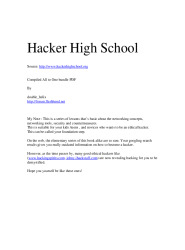How to become an Ethical Hacker
This is a series of lessons that's basic about the networking concepts, networking tools, security and countermeasures.
This is suitable for your kids /teens , and novices who wants to be an ethical hacker.
This can be called your foundation step.
Table of contents
- LESSON 1 BEING A HACKER
- Introduction and Objectives
- LESSON 2 BASIC COMMANDS IN LINUX AND WINDOWS
- Requirements and Setup
- System Operation: WINDOWS
- How to open an MS-DOS window
- System Operations: Linux
- How to open a console window
- Commands and tools (Linux)
- LESSON 3 PORTS AND PROTOCOLS
- Basic concepts of networks
- Devices
- Topologies
- TCP/IP model
- Introduction
- Layers
- Application
- Transport
- Internet
- Network Access
- Protocols
- LESSON 4 SERVICES AND CONNECTIONS
- Services
- HTTP and The Web
- E-Mail – POP and SMTP
- IRC
- FTP
- Telnet and SSH
- DNS
- DHCP
- LESSON 5 SYSTEM IDENTIFICATION
- Identifying a Server
- Identifying the Owner of a Domain
- Identifying the IP address of a Domain
- Identifying Services
- Ping and TraceRoute
| Size : | 3005.24 Kb |
| File type : | |
| Downloads: | 625 |
| Created: | 2019-05-03 |
Warning: Trying to access array offset on false in /home/tutovnfz/public_html/article.php on line 233
Others Cyber Security Tutorials
Others related eBooks about How to become an Ethical Hacker
Migrating to Cloud-Native Application ArchitecturesDownload free course Migrating to Cloud-Native Application Architectures, pdf file on 58 pages by Matt Stine....
HackSpace Magazine: Issue 47Download free course HackSpace Magazine: Issue 47, pdf file on 116 pages by HackSpace Team....
Think Stats, 2nd Edition: Exploratory Data Analysis in PythonIf you know how to program, you have the skills to turn data into knowledge, using tools of probability and statistics. This concise introduction shows you how to perform statistical analysis computationally, rather than mathematically, with programs written in Python. ...
Ionic 4 SuccinctlyDownload free course Ionic 4 Succinctly, pdf file on 101 pages by Ed Freitas....
Agile Development for Serverless PlatformsYou need more than great dev tools to release great software; you need an efficient pipeli..., download free Agile Development tutorial in PDF (124 pages) created by ....
Everything Is DistributedDownload free course Everything Is Distributed, pdf file on 38 pages by Courtney Nash, Mike Loukides....
Making Servers WorkDownload free course Making Servers Work, pdf file on 281 pages by Jamon Camisso....
Introductionto the Assembly LanguageThis tutorial represente a brief introduction to assembly programming ,training courses in PDF under 77 pages designated to beginners....
Platform Embedded Security Technology RevealedPlatform Embedded Security Technology Revealed is an in-depth introduction to Intel's plat..., download free Security Technology tutorial in PDF (272 pages) created by Xiaoyu Ruan ....
Structure and Interpretation of Computer Programs, 2nd EditionUsing Scheme, a dialect of the Lisp programming language, the book explains core computer science concepts....
